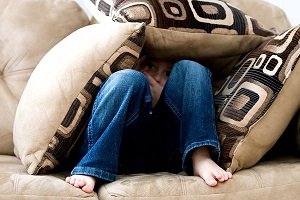Symptom of bipolar disorder - How to Remove Difficult to Handle Bipolar Symptoms
TweetSigns and symptoms vary widely, depending on whether the patient is experiencing a manic or depressive episode. Before the onset of overt symptoms, however, many patients with bipolar disorder have an energetic and outgoing personality with a history of wide mood swings. Bipolar disorder may be associated with high levels of creativity or high levels of destruction.
During the assessment interview,the manic patient typically appears grandiose, euphoric, expansive, or irritable with little control over her activities and responses. She may describe hyperactive or excessive behavior, including elaborate plans for numerous social events, efforts to renew old acquaintances by telephoning friends at all hours of the night, buying sprees, or promiscuous sexual activity. She seldom hesitates to start projects for which she has little aptitude.
The patient's activities may have a bizarre quality, such as dressing in colorful or strange garments, wearing excessive makeup, or giving advice to passing strangers. She commonly expresses an inflated sense of self esteem, ranging from uncritical self confidence to marked grandiosity, which may be delusional.
Note the patient's speech patterns and concentration level. Accelerated and pressured speech, frequent topic changes, and flights of ideas are common features during the manic phase. The patient is easily distracted and responds rapidly to external stimuli,such as background noise or a ringing telephone.
Physical examination of the manic patient may reveal signs of malnutrition and poor personal hygiene. She may report sleeping and eating less as well as being more physically active than usual.
Hypomania, which is more common than acute mania, is similar to mania, but is less severe and delusions, hallucinations, and other symptoms of psychotic intensity aren't present. Three classic symptoms of hypomania may be recognized during the assessment interview: euphoric but unstable mood, pressured speech, and increased motor activity. The hypomanic patient may appear elated, hyperactive, easily distracted, talkative, irritable, impatient, impulsive, and full of energy but seldom exhibits flight of ideas.
The patient who experiences a depressive episode may report a loss of self-esteem, overwhelming inertia, social withdrawal, and feelings of hopelessness, apathy, or self-reproach. She may believe that she's wicked and deserves to be punished. Her groWing sadness, guilt, negativity, and fatigue place extraordinary' burdens on her family.
During the assessment interview, the depressed patient may speak and respond slowly. She may complain of difficulty concentrating or thinking clearly but usually isn't obviously disoriented or intellectually impaired.
Talking with a psychiatrist helps
Anyone who has bipolar disorder knows that it is a difficult condition to work with. The use of different treatments to handle bipolar symptoms can help and working with a psychiatrist can help. A good psychiatrist is someone who is willing to listen to a person and figure out what is causing someone’s problems. This is used as a means of allowing a person to become more confident about who one is and therefore less likely to deal with some of the symptoms that can come with this disorder.
Lifestyle changes are needed
Sometimes lifestyle changes can be used to get bipolar symptoms to be reduced. This is because bipolar symptoms are often caused by a number of different triggers in life. These include events, places and objects among other things. Practically anything can cause one’s bipolar disorder to become more evident.
The use of lifestyle changes can help to ensure that one’s mind is corrected. This is because some changes can work to keep a person from dealing with any of the things that can cause symptoms to be reduced. Removing the triggers of one’s bipolar disorder can be a beneficial thing to see.
Ketamine may be useful
A good type of medication that can work to handle bipolar symptoms is Ketamine. This is a medication that is often used by people who deal with substantial pains. It is an anesthetic but it has been found that the brain can easily feel relaxed when Ketamine is used. This can be used to ensure that one’s bipolar symptoms can be well controlled in a reduced amount of time. Having a relaxed state of mind can help to ensure that the effects of bipolar disorder can be reduced and easier for a person to work with.
Physical examination may reveal reduced psychomotor activity, lethargy,low muscle tonus, weight loss, slowed gait, and constipation. The patient may also report sleep disturbances (falling asleep, staying asleep, or early morning awakening), headaches, chest pains, and heaviness in the limbs. Typically, symptoms are worse in the morning and gradually subside as the day goes on.
Concerns about her health may be come hypochondriacal: She may worry excessively about having cancer or some other serious illness. In an elderly patient, physical symptoms may be the only clues to depression.
Suicide is an ever-present risk, no matter what age, especially as the depression begins to lift. At that point, a rising energy level may strengthen the patient's resolve to carry out suicidal plans. The suicidal patient may also harbor homicidal ideas - for example, thinking of killing her family either in anger or to spare them pain and disgrace.
What are signs and symptom of mania (or a manic episode of bipolar disorder)?
Symptoms of mania (or a manic episode of bipolar disorder) include:
- Increased energy, activity, and restlessness
- Excessively "high," overly good, euphoric mood
- Extreme irritability
- Racing thoughts and talking very fast, jumping from one idea to another
- Distractibility, can't concentrate well
- Little sleep needed
- Unrealistic beliefs in one's abilities and powers
- Poor judgment
- Spending sprees
- A lasting period of behavior that is different from usual
- Increased sexual drive
- Abuse of drugs, particularly cocaine, alcohol, and sleeping medications
- Provocative, intrusive, or aggressive behavior denial that anything is wrong
What are signs and symptoms of depressive episode of bipolar disorder?
Signs and symptoms of depression (or a depressive episode of bipolar disorder) include:
- Lasting sad, anxious, or empty mood
- Feelings of hopelessness or pessimism
- Feelings of guilt, worthlessness, or helplessness
- Loss of interest or pleasure in activities once enjoyed, including sex
- Decreased energy, a feeling of fatigue or of being "slowed down"
- Difficulty concentrating, remembering, making decisions
- Restlessness or irritability
- Sleeping too much, or can't sleep
- Change in appetite and/or unintended weight loss or gain
- Chronic pain or other persistent bodily symptoms that are not caused by physical illness or injury
- Thoughts of death or suicide, or suicide attempts
A depressive episode is diagnosed if 5 or more of these symptoms last most of the day, nearly every day, for a period of 2 weeks or longer.
Hypomania is a milder form of mania that has similar but less severe symptoms. In a hypomanic episode symptoms are present for at least 4 days.
Bipolar Disorder - Bipolar Disorder is the form of depressive illness in which the sufferer has periods of being on a high, as well as periods of depression.
The less severe form of high in bipolar disorder is hypomania.
Treatment of Bipolar Disorder - Effective treatment is available for bipolar disorder.
What is the cause of Bipolar Disorder? Learn about various causes of bipolar disorder such as family tree, your genes, loss of job, etc.
What are the symptom of Bipolar Disorder? There are various symptoms of bipolar disorder.
Can Adolescent have bipolar disorder symptom? Bipolar disorder can occur in adolescents and has been investigated by federally funded teams in children as young as age 6.
Rapid Cycling Bipolar Disorder symptom the essential feature of rapid cycling bipolar disorder is the occurrence of four or more mood episodes during the previous 12 months.
Can Children Have Bipolar Disorder Symptom? Children experience faster mood swings than adults, often cycling many times within a day.
Bipolar disorder Symptom - a case study Millions of Americans diagnosed with mental illness lead healthy lives because of information discovered through clinical studies.
History of bipolar disorder - Bipolar disorder has left its mark on history.
Importance of Bipolar disorder diagnosis symptom Diagnosis is important, because it guides treatment decisions.
What is the need of bipolar disorder symptoms diagnosis in childhood? The importance of proper diagnosis cannot be overstated.
What are the types of bipolar disorder? Learn about various types of bipolar disorder.
How can u help ur child and what is the role of parents and what are bipolar disorder symptom in child? Your child can reduce the minor mood swings and stresses that sometimes lead to more severe episodes by adhering to the following tips.


Sometimes crying or laughing
are the only options left,
and laughing feels better right now.

Current Issue
 Self Help Leaflets Take the help of our self help leaflets or booklets. |
 The DG Magazine All about living with depression |


















